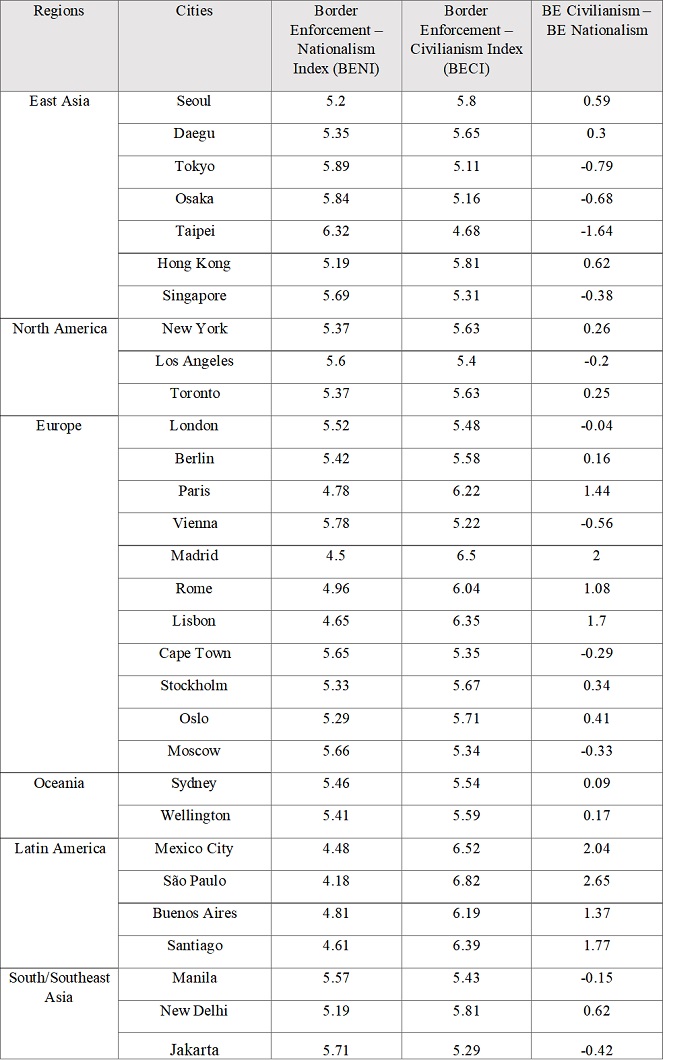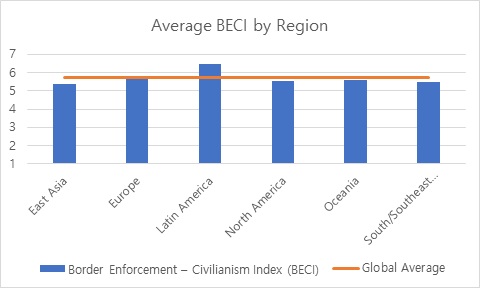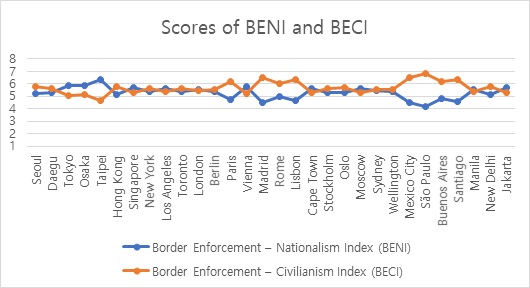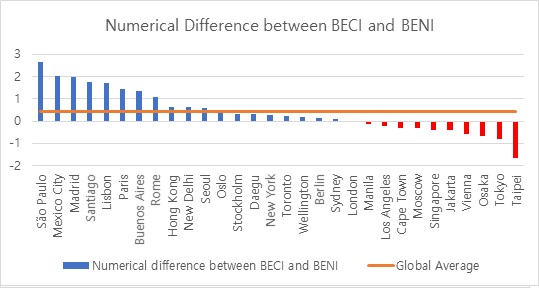Impact of Banning Entry to Foreign Nationals during the
COVID-19
1.
Background
COVID-19
data analysis 5 series will focus on how emergency measurements during the
COVID-19 influence the nationalism around the world. To illustrate, we will
analyze the survey results of opinions of global citizens whether they perceive
a certain policy will lead a country to nationalism or citizens’ cooperation.
International cooperation is occasionally disturbed by countries with strong
and offensive nationalism, and sometimes, even a central government cannot
control the national outrage triggered by nationalistic sentiment. Even worse,
irrational nationalism would bring about racism and xenophobia, which severely
undermines the free and open market around the globe. On the contrary,
cooperation among citizens and governments would enhance the effectiveness of
abating the crisis and it will help fast recovery from an emergency to everyday
life.
The first confirmed case of the coronavirus disease in
South Korea was reported on January 20th, 2020. Subsequently, there
was a national petition towards the Blue House of banning entry to Chinese
visitors and the same recommendation by the Korean Medical Association (KMA).
Also, many politicians from opposition parties mentioned barring visitors from
China. Nevertheless, the Moon administration banned only on foreign visitors
who had Hubei history. In this regard, the Blue House maintained that the
outright ban on Chinese nationals is not profitable, since the number of
Chinese arrivals from China has recently decreased sharply. Also, it explained
that the government’s decision was in line with the World Health Organization
(WHO)’s guidelines on communicable diseases. However, there was a continuous
voice from the society that South Korea should block the entry of foreigners
from China.
2.
Research
Topic
In the time of the COVID-19 pandemic, it
is vital to sustaining social stability along with protecting the public
health. Banning entry to foreign travelers undermines free trade, free movement,
and foreign relations; however, it is also of equal importance for a government
to protect their nationals’ health and slow the transmission of communicable
diseases within a country. In this section, we will scrutinize how global
individuals think of entry ban policies, especially how they assess the policy’s
influence on a country’s nationalism and civilianism during the COVID-19
crisis.
3.
Questionnaire
Used
Survey Question II-7: “While fighting
against a global pandemic like COVID-19, a country may begin to follow either a
state-centric and chauvinist path, or a democratic path based on citizen
participation. In terms of banning entry of foreign nationals, what direction
do you expect the following policies/trends to take?”
The answers consist of a 10-point scale,
with higher scores indicating an individual believes the policy will lead
citizens to democratic/participatory citizenship and lower scores demonstrating
a person acknowledges the measure will result in citizens’
state-centric/chauvinistic.
4.
Major
Outcomes
Table 1: Border Enforcement –
Nationalism Index (BENI) and Border Enforcement –
Civilianism Index (BECI)
by Citizens of 30 Global Cities

Respondents are asked to choose one score
to represent their ideas on the question, and the average scores of each city
indicate the Border Enforcement – Civilianism Index (BECI). It demonstrates how
much do citizens of a city consider the entry ban policy will cause citizens’
cooperation and participation amid the crisis, and the higher the score is, the
more individuals think highly of the policy. Meanwhile, the reverse scaling was
used in the Border Enforcement – Nationalism Index (BENI), which means that 11
minus BECI is the Border Enforcement – Nationalism Index (BENI). Similarly, the
higher the BENI score is, the more a citizen speak ill of the policy, under the
democratic and liberal principles. Finally, the numerical differences between
the two scores were calculated in order to show which side a city is putting
more significance. To illustrate, the higher a numerical difference is, the more
citizens of the city underscore the above-mentioned policy in the course of the
pandemic crisis.
Table 2: Average Border Enforcement
– Civilianism Index (BECI) by Region
|
Regions
|
Average Border Enforcement - Civilianism Index (1 –
10)
|
|
East Asia
|
5.36
|
|
Europe
|
5.77
|
|
Latin America
|
6.49
|
|
North America
|
5.55
|
|
Oceania
|
5.57
|
|
South/Southeast Asia
|
5.51
|
The scores in the
table are the average Border Enforcement – Civilianism Index (BECI) of the
global citizens by region. To be specific, the lowest score of 5.36 was rated
by East Asian citizens on average. It exhibits that people in this region least
likely to deem that the entry ban on foreigners will bring about civilianism at
a time of crisis. On the contrary, the highest score of 6.49 was rated by Latin
American citizens, which illustrates that people here are most likely to highlight
a certain policy and believe the measurement would lead to citizens’ cooperation
in society.
Figure 1: Bar Graph of Average Border
Enforcement – Civilianism Index (BECI) by Region

Figure 1 is the
visualized graph of Table 2, and the orange line is the world average Border
Enforcement – Civilianism Index (BECI). That Latin American citizens think highly
of the travel bans amid the crisis is evidenced by the figure. On the other
hand, Europe, North America, Oceania, South/Southeast Asia, and East Asia’s
average BECI scores are under the global average, implying that these regions
are not accentuating the policy compared to Latin America. For further detailed
analysis, let’s see each city’s score of BECI and BENI.
Figure 2: Line Graph of Border
Enforcement – Nationalism Index (BENI) and Border Enforcement – Civilianism
Index (BECI)

This figure is a visualized version of
Table 1, and the most
outstanding finding of Figure 2 is that Southern Europe and Latin American
citizens, represented by Madrid, Rome, Lisbon, Mexico City, Sao Paulo, Buenos
Aires, and Santiago, show a huge gap between Border Enforcement Nationalism
Index and Civilianism Index. It means that citizens in these regions generally
regard that entry ban on foreigners will engender civilianism in society.
Besides, global citizens are holding divergent views on the policy of a travel
ban.
Figure 3: Bar Graph of Numerical Difference
between Border Enforcement – Civilianism Index (BECI) and Border Enforcement –
Nationalism Index (BENI)

The differences
between BECIs and BENIs are drawn as a bar graph, shown in Figure 3. The orange
bar indicates the global average difference score (0.42). Cities with negative
numerical differences are marked with red bars, indicating citizens of that
city perceive that border enforcement measurement will lead to a country to
state-centric and chauvinism; yet, cities with blue bars express that the
policy is crucial to enhance the unity among citizens during the coronavirus.
As shown in Figure 3, all Latin American cities think highly of the entry ban
on foreigners, while Taipei, Tokyo, and Osaka citizens conceive that
implementing on entry ban on foreigners will lead a country’s citizens to
nationalism.
5.
Summaries
and Further Tasks
a.
Data
analysis shows contradicting views on banning entry to foreigners during the
COVID-19 crisis.
b.
Latin
America highly believes that the strict immigration policy will lead a country
to civilianism rather than nationalism.
c.
Even
though the average BECI of East Asia scored the lowest, there were different
scores by each city in the region. To be specific, South Korea and Hong Kong hold
that the ban on foreigners would have a positive effect and lead a country to
civilianism, while Japan, Taiwan, and Singapore have the opposite opinion.
d.
The
study is limited to descriptive research, and therefore, a more detailed
explanative investigation is required to further understand the global citizens’
consciousness presented above. For instance, why there are distinct reactions in
East Asia? Why Latin America along with Southern European countries are having a
similar opinion on the policy?
|